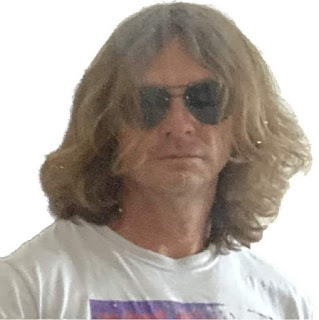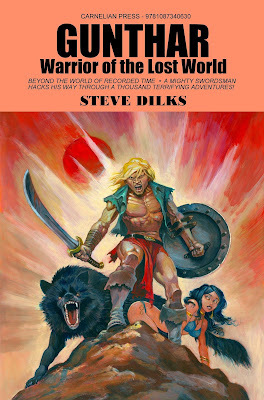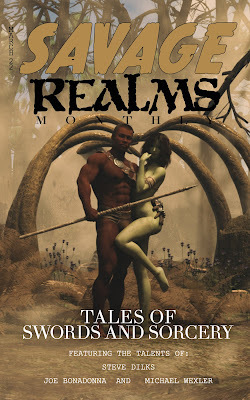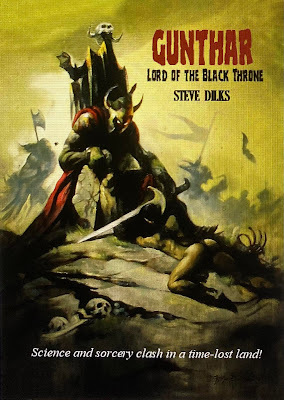AUTHOR INTERVIEW - STEVE DILKS
David A. Riley: Steve, you’ve been prominent inthe swords and sorcery genre for some time now, not only as a writer but aseditor and publisher with your own imprint Carnelian Press, through which youbrought out two fanzines, The Hyborian Gazette and TwilightEchoes – Tales of Swords & Dark Magic. Which came first, the writingor the publishing, and can you give us a rundown on your career so far?
 Steve Dilks: With the fanzines, I just wanted toget something up and running really. The whole REH community was gettingpretty boring to me. I wanted to get out of the whole debate, argument andcounter argument thing and put something creative out there. I saw a lot oftalent lurking in the peripheries, and I wanted a place to express that; aplace where I could shout; “Come and look at what these guys are doing!” Alot of great artists and writers ended up getting involved. On thatfront, The Hyborian Gazette was a real success. It attracted alot of interest, but it was too much for me to keep up with the demand. Idecided to stop doing it, mostly for my own sanity. I was printing it by handin my bedsit and taking trips to the Post Office everyday but making zeromoney. Twilight Echoes was an off-shoot where I planned to showcasenew talent in the sword & sorcery genre. The idea and execution weregreat, but it flopped. No one bought it and the whole s-&-s scene explodeda couple of years later anyway with much better realized products.
Steve Dilks: With the fanzines, I just wanted toget something up and running really. The whole REH community was gettingpretty boring to me. I wanted to get out of the whole debate, argument andcounter argument thing and put something creative out there. I saw a lot oftalent lurking in the peripheries, and I wanted a place to express that; aplace where I could shout; “Come and look at what these guys are doing!” Alot of great artists and writers ended up getting involved. On thatfront, The Hyborian Gazette was a real success. It attracted alot of interest, but it was too much for me to keep up with the demand. Idecided to stop doing it, mostly for my own sanity. I was printing it by handin my bedsit and taking trips to the Post Office everyday but making zeromoney. Twilight Echoes was an off-shoot where I planned to showcasenew talent in the sword & sorcery genre. The idea and execution weregreat, but it flopped. No one bought it and the whole s-&-s scene explodeda couple of years later anyway with much better realized products.
 As for my own writing, that was already there. Myfirst proper sale was in 2019 when Weirdbook published my SFstory, ‘The Idols of Xan’. I’m currently wrapping up a novelette forJason M Waltz’ swan-song anthology, Neither Beg Nor Yield, whichshould be out sometime early next year.
As for my own writing, that was already there. Myfirst proper sale was in 2019 when Weirdbook published my SFstory, ‘The Idols of Xan’. I’m currently wrapping up a novelette forJason M Waltz’ swan-song anthology, Neither Beg Nor Yield, whichshould be out sometime early next year.DAR: Whichother writers have been the biggest influences on your own sword and sorcerystories?
SD: Ok, I’ll come clean. I’m influenced by all ofthem! Even the bad ones! Why not? Sometimes it’s just a mesh of everything andnothing. Even other genres!
DAR: Likemany sword and sorcery writers your stories have a number of continuingcharacters, like Bohun of Damzullah. Do you think this is an important featureand something readers prefer?
SD: For me, it’s a fun thing to do and those wholike the Bohun stories enjoy reading them. There’s just something fun about theserial format, following a character on a journey through a pre-classical world,exploring strange cities and hostile landscapes.
 DAR: Whatare your feelings about sword and sorcery novels? These are not common, andsome people feel the genre is better suited to the short story and noveletteformats. Robert E. Howard only completed one Conan novel. Do you think youwould ever venture into attempting one yourself?
DAR: Whatare your feelings about sword and sorcery novels? These are not common, andsome people feel the genre is better suited to the short story and noveletteformats. Robert E. Howard only completed one Conan novel. Do you think youwould ever venture into attempting one yourself?SD: I’m actually writing a short s-&-s novelat the moment. I’ve never quite got why people think they’re not common. Thereare literally hundreds. I could do you a top ten list of my favourites rightnow! The only reason sword & sorcery was written in shorter formats wasbecause they initially started in the pulps which catered for the short-storymarket. But even then there were exceptions. A. Merritt’s The Ship of Ishtar,for instance, was published in 1924 and Poul Anderson’s The Broken Swordcame out in 1954. There have been thousands of sword-&-sorcery novelssince the ‘60s. Michael Moorcock wrote a fair few— The Eternal Champion,the Elric, Corum and Hawkmoon books. So did L. Sprague de Camp. Lin Carter dida series or two as did John Jakes and Gardner F. Fox. Then there were KarlEdward Wagner’s Kane novels, David C. Smith’s Oron, James Silke’sDeath Dealer series…
DAR: Doyou ever worry what constitutes a true sword and sorcery story or are youflexible in your attitude to the genre? Some people seem highly interested inlaying down rules and lists of what’s needed to qualify as such. Does thisbother you at all?
 SD: Nope. If a story is well written it doesn’tneed to worry about any of these things.
SD: Nope. If a story is well written it doesn’tneed to worry about any of these things. DAR: Printon demand and the increase in indie publishers has obviously had a big impacton the genre in recent years, with magazines like Savage RealmsMonthly and the increased number of anthologies that seem to pop up withimpressive frequency at the moment, as, of course, have online magazines suchas Swords & Sorcery Monthly, not to mention eBooks – and, morerecently, audio as well. Do you sometimes fear we could face an eventual glutof the market and that today’s apparent popularity might result in tomorrow’sboredom?
SD: Absolutely. It will happen, and go the sameway the whole Cthulhu obsession did a few years ago. But as Lovecraft himself oncewrote— ‘That is not dead which can eternal lie…’
DR: Where do you see the genre going next? Do you expectto see it shrink once more or, because of the proliferation of POD and indiepresses, do you see it soldiering on? After all, without a reliance on the bigpublishers anymore, so long as there is a substantial enough core of fans outthere to keep the genre alive, it will remain so. If so, who will be the nextgiants as such in the genre. In its golden age there were the likes of RobertE. Howard and Clark Ashton Smith, followed by Henry Kuttner, Fritz Leiber, C.L. Moore, Michael Moorcock and a handful of others. Who do you see astoday’s? Or is there instead a vast proliferation of names too numerous tomention?
SD: So long as the stories are good andthe writers, editors and publishers are true to their craft there will alwaysbe readers. Those that will make a name for themselves in the genre will bethose that can also write beyond it. All the writers you just mentioned areknown for other things. Believe it or not, Howard’s biggest success in hislifetime were his humuorous western stories featuring Breckenridge Elkins—whicheveryone should read by the way. Kuttner was a diverse hand who worked in SF,horror and fantasy. Leiber won the Hugo Award for The Big Time and wrotecritically acclaimed horror like Conjure Wife and A Spectre is HauntingTexas. Moorcockedited New Worlds and wrote The Dancers at the End of Time, A Curefor Cancer and Gloriana. A genre is only as healthy as the stimulusbehind it.
For more information about books by or including stories by Steve Dilks use the following links:
Steve Dilks USA



